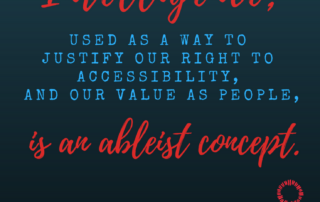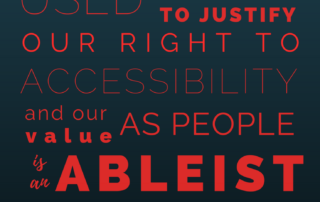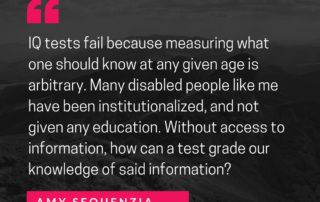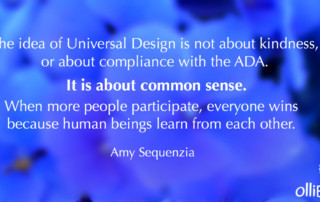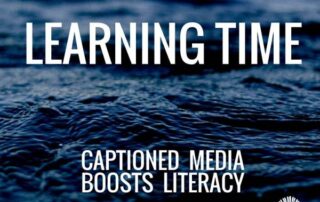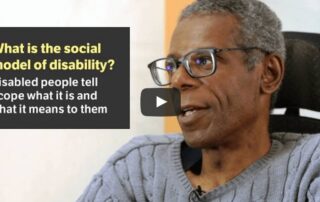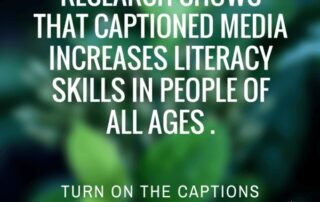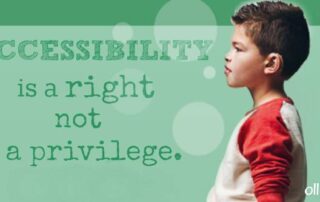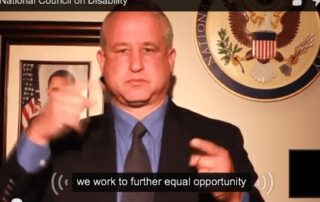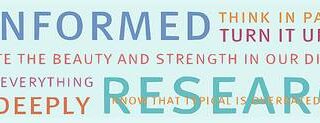Intelligence Is an Ableist Concept
Intelligence Is an Ableist Concept, by Amy Sequenzia. Warning: use of the R-word. Am I “Intelligent”? Too many times I see the word "intelligence" in articles that are supposedly about disability rights. The word comes up to explain that being disabled does not mean that there is a "problem" with the brain. Many times this happens when a physically disabled person, or someone talking about physical disabilities, want to point out that “their minds are fine”. The word is also used to tell stories of non-speaking Autistics who learned to type to communicate and "proved" that they are "intelligent".
Universal Design and Disability Acceptance
by Amy Sequenzia Universal Design If you are reading this, you probably should know that inclusion of disabled students, with the supports they need, is beneficial to all students. Universal Design is a thing. It means one builds things, and creates products that are accessible to all. It can also be used in classrooms, making sure all students have access to the same education, accommodating individual needs in a flexible environment. The idea of Universal Design is not about kindness, or about compliance with the ADA. It is about common sense. When more people participate, everyone wins because human beings
Epilepsy, And Living Epileptic
Epilepsy I am writing this as, partly, a rant. I don't want pity, and I don't feel sorry for myself. If you think you need to “feel” something, feel anger at the lack of funding on research that can actually save lives, the lack of understanding about what epilepsy is, the lack of accessibility, and the stigma. feel anger at the lack of funding on research that can actually save lives, the lack of understanding about what epilepsy is, the lack of accessibility, and the stigma Epilepsy is Complicated Epilepsy is complicated. It affects people in so many
How Being Included Changed This Boy’s Life
Having opportunities to learn with everyone could access more opportunities for all.
World’s First Kid-Friendly Wheelchair From Wheelchairs of Hope
It's unacceptable that any child miss out on an education because of not having a wheelchair, and Wheelchairs of Hope is doing something about it. Wheelchairs of Hope is an initiative based on the belief that mobility from early childhood is a gate to education, and that access to education creates a new generation with improved skills, higher self-confidence levels, and more hope for the future. The UN, the WHO, and two Nobel Prize winners are backing the work of Wheelchairs of Hope. With production sites spanning three different regions, Wheelchairs of Hope will be able to guarantee shipment of
The Impact of 250 Words on Literacy
Ollibean Literacy Lifehacks : Tools for parents and care providers without education backgrounds to easily provide literacy instruction. Sign up for our free Flashcards of the 250 Words that represent over two-thirds of captioned television.
What’s the Social Model of Disability?
What is the social model of disability and why is it important ?
How to Improve Literacy Without Even Trying
One of the simplest things you can do to improve your child’s reading skills is already in your home. Closed captioning is free, easy to use, and a natural literacy booster. Research shows that closed captioning increases literacy skills in people of all ages. Simply having the captions on can dramatically improve vocabulary, word recognition, comprehension, and reading . Closed Captioning supports literacy for all. by Lauri Swann Hunt Turn on the closed captioning in your home; on your tvs, ipads, phones, and computers. Many people think closed captions are only beneficial for deaf and hard of hearing people. And,
DCMP: Described and Captioned Media Program
Explore the Described and Captioned Media Program (DCMP) Website to learn it promotes and provides equal access to communication and learning for students who are blind, visually impaired, deaf, hard of hearing, or deaf-blind. The DCMP is an idea that works thanks to funding by the U.S. Department of Education and administration by the National Association of the Deaf.
Accessibility Is a Right Not a Privilege
Accessibility is a right not a privilege. 20 posts on Accessibility, Universal Design, and Inclusion It's Time to Go Beyond Access Creating Equal Opportunities For ALL Students to Participate in School Athletics State Obligations UNESCO Accessible Instructional Materials (AIM) Inclusion Is A Right Not A Privilege Paula Kluth on The Inclusive Class Roundtable The National Center on Accessible Instructional Materials Why Would We Want Inclusive Education? Ollibean Spotlight: Kerima Cevik Pay It Forward Activist How AAC and assistive tech make classrooms better for all : Paula Kluth The Case for Inclusion Part 3: Sea Change Access to the
Worth A Second Look: Haben Girma’s 2010 Speech on 35th Anniversary of IDEA
"One of the treasures of IDEA is that it provides children with disabilities the luxury of just being students. Unfortunately there are still many school districts where students with disabilities are denied their right to an education." Haben Girma
Meet the Members of the 2013 National Council on Disability
The National Council on Disability works to further equal opportunity, self-sufficiency, independent living, inclusion and full integration of people with disabilities into the civic, social, and economic fabric of American life.
ASL-STEM: Expanding American Sign Language’s Place in the Sciences
The ASL-STEM (Enabling American Sign Language to grow in Science, Technology, Engineering and Mathematics) Forum is up and running! The purpose of ASL-STEM's online community is to bring educators, interpreters, captioners, students, and others together in order to help build ASL's technical vocabulary from the ground up.
Concentration Fatigue on Deaf Children
Many deaf children have not been given the space to talk about what impact deafness has on them and to work out strategies to deal with it. Why does advice to teachers talk far more about language and communication, rather than concentration fatigue?
Closed Captioning Helps All Students
"Not only were students talking about how much having the captions helped them as they took notes, their test scores went up," Collins said. During the first year of a 2-year case study, he showed videos without captions to establish a baseline of student comprehension, then in the second year turned on the captions and began to see improvement in comprehension and grades. "During the baseline year, there were a lot of Cs. In the second years, they went from Cs, Ds and Fs to As, Bs and Cs. It was really significant improvement," he said. "We're living in an
Senator Harkin Delivers Speech in ASL Upon ADA Passage in 1990
Upon passage of the landmark Americans with Disabilities Act (ADA) on July 13th, 1990, Senator Tom Harkin delivered a speech on the Senate floor in American Sign Language. Harkin, whose brother Frank was deaf, was the lead Senate author of the ADA, which was enacted later that year. His speech is the first in American Sign Language to be delivered from the Senate floor.
AAC Helps Learners with Complex Communication Needs Reach Their Full Potential
" A lot of these kids end up not reaching their full potential because they suffer from low expectations. People think they don't speak well, so we shouldn't have them in the regular classroom, but a lot of the kids I work with, they're cognitively fine. They're perfectly capable. They just need a viable means of communication to really help them through that." Cathy Binger
Yoga , Naturally Inclusive
Ryan McGraw is a 30-year-old yoga teacher who has cerebral palsy. He doesn't fit the mold, which is fine, because he's molding yoga routines to fit his needs.
Need for culturally sensitive treatment for deaf patients with psychiatric disorders
Members of the Deaf community who have mental health problems need culturally sensitive treatment to avoid misdiagnosis and inappropriate treatment, according to a report in the March Journal of Psychiatric Practice. The journal is published by Li
US DOE “Access to Sports for Students with Disabilities Is a Civil Right”
U.S. Education Department is telling schools they must include students with disabilities in sports programs or provide equal alternative options.
The Inclusive Class: Supporting Students with Learning Disabilities
Nicole and Terri are looking forward to interviewing Dr. Sheldon Horowitz about ways classrooms can support children with learning disabilities.
Can You Hear This?
Take 5 Minutes for a reality check.This video is a must watch for any student that is Deaf or Hard of Hearing, their families, educators, and ALL who work with them.
Ollibean Talks to Ray Ellis, director of “Certain Proof: A Question of Worth”
"All of these children have one thing in common. They were always having to prove themselves, over and over and over again." Ray Ellis
They call me Barney Fife
One out of four people that use accessible parking spaces, should not be using them. One out of four people think it's ok to park in a spot specifically designed and strategically to make it easier for someone who uses a wheelchair to have enough space to actually open the door to their van? Ok to park in a space designated for someone who has a heart condition so they don't have to walk quite as far?

